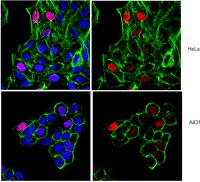Establishment of histone h3 methylation on the inactive X chromosome requires transient recruitment of Eed-Enx1 polycomb group complexes.
Silva, Jose, et al.
Dev. Cell, 4: 481-95 (2003)
2003
Mostra il sommario
Previous studies have implicated the Eed-Enx1 Polycomb group complex in the maintenance of imprinted X inactivation in the trophectoderm lineage in mouse. Here we show that recruitment of Eed-Enx1 to the inactive X chromosome (Xi) also occurs in random X inactivation in the embryo proper. Localization of Eed-Enx1 complexes to Xi occurs very early, at the onset of Xist expression, but then disappears as differentiation and development progress. This transient localization correlates with the presence of high levels of the complex in totipotent cells and during early differentiation stages. Functional analysis demonstrates that Eed-Enx1 is required to establish methylation of histone H3 at lysine 9 and/or lysine 27 on Xi and that this, in turn, is required to stabilize the Xi chromatin structure. | 12689588
 |
Regulation of transcription by a protein methyltransferase.
Chen, D, et al.
Science, 284: 2174-7 (1999)
1998
Mostra il sommario
The p160 family of coactivators, SRC-1, GRIP1/TIF2, and p/CIP, mediate transcriptional activation by nuclear hormone receptors. Coactivator-associated arginine methyltransferase 1 (CARM1), a previously unidentified protein that binds to the carboxyl-terminal region of p160 coactivators, enhanced transcriptional activation by nuclear receptors, but only when GRIP1 or SRC-1a was coexpressed. Thus, CARM1 functions as a secondary coactivator through its association with p160 coactivators. CARM1 can methylate histone H3 in vitro, and a mutation in the putative S-adenosylmethionine binding domain of CARM1 substantially reduced both methyltransferase and coactivator activities. Thus, coactivator-mediated methylation of proteins in the transcription machinery may contribute to transcriptional regulation. | 10381882
 |












